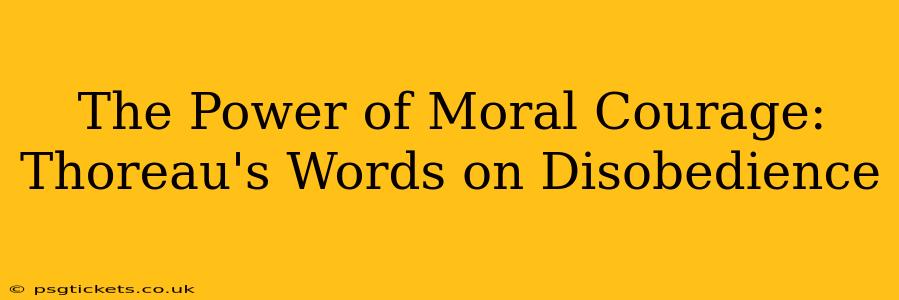Henry David Thoreau's essay, "Civil Disobedience," remains a potent and timely exploration of moral courage and the individual's responsibility to resist unjust laws. Published in 1849, its influence echoes through history, inspiring movements for social justice and challenging the very foundations of oppressive systems. This essay delves into the core tenets of Thoreau's philosophy, examining the power of individual conscience and the enduring relevance of his message in the modern world.
What is Civil Disobedience, According to Thoreau?
Thoreau's concept of civil disobedience isn't about anarchy or violence. Instead, it's a deliberate, conscientious refusal to comply with unjust laws. He argues that a truly just government respects individual conscience and allows for dissent. When the government fails to do so, individuals have a moral obligation to resist, even if that means facing legal consequences. This resistance is not borne out of hatred but from a deep commitment to a higher moral principle. It's about upholding one's integrity and challenging the status quo when it contradicts one's deeply held beliefs.
What are the Key Principles of Thoreau's Civil Disobedience?
Several key principles underpin Thoreau's argument:
- Individual Conscience: Thoreau places supreme importance on the individual's conscience as the ultimate arbiter of right and wrong. He believed that following one's conscience, even if it means defying the law, is a higher moral imperative.
- The Importance of Truth: Truth, for Thoreau, is paramount. He believed that individuals should be willing to suffer the consequences of defying unjust laws in pursuit of truth and justice.
- The Limitation of Majority Rule: Thoreau challenged the notion that majority rule automatically equates to justice. He argued that a government that acts unjustly, even with the support of the majority, loses its moral authority.
- The Power of Example: Thoreau believed that individual acts of civil disobedience, even if seemingly small, could inspire others to question authority and ultimately lead to widespread change.
How is Thoreau's Civil Disobedience Relevant Today?
Thoreau's ideas remain strikingly relevant in contemporary society. We see his principles reflected in various social justice movements throughout history and today, including:
- The Civil Rights Movement: Martin Luther King Jr. explicitly cited Thoreau's essay as an inspiration for his philosophy of nonviolent resistance.
- The Anti-Apartheid Movement: Activists in South Africa used civil disobedience to challenge the racist regime.
- Environmental Activism: Modern environmental activists often employ civil disobedience tactics to protest environmental destruction.
- Protests Against Government Overreach: In numerous countries, citizens engage in civil disobedience to oppose government policies they deem unjust or oppressive.
What are the Potential Risks and Challenges of Civil Disobedience?
While Thoreau championed civil disobedience, he also acknowledged its inherent risks. These include:
- Legal Penalties: Participants can face arrest, fines, and imprisonment.
- Social Reprisal: Individuals might face ostracism, job loss, or other forms of social pressure.
- Potential for Violence: Although Thoreau advocated for nonviolent resistance, there's always the risk that protests could escalate into violence.
- Ineffectiveness: Civil disobedience doesn't always lead to the desired change. The government might remain unresponsive, or the movement may fail to gain sufficient support.
What are Some Examples of Civil Disobedience in History?
History provides numerous examples of successful and unsuccessful acts of civil disobedience:
- The Salt March (India): Mahatma Gandhi's Salt March is a powerful example of mass civil disobedience that challenged British rule in India.
- The Greensboro Sit-Ins (USA): These sit-ins, where African American students peacefully occupied segregated lunch counters, played a pivotal role in the Civil Rights Movement.
- The Suffragette Movement (UK): The women's suffrage movement employed various tactics of civil disobedience to fight for voting rights.
Is Civil Disobedience Always Justified?
Civil disobedience, while a powerful tool for social change, is not always justified. It requires careful consideration of the following:
- The Severity of the Injustice: The injustice being protested must be significant enough to warrant the risks involved.
- The Likelihood of Success: There should be a reasonable chance that the action will bring about positive change.
- The Means Employed: The methods used should be nonviolent and proportionate to the injustice.
Conclusion: The Enduring Legacy of Thoreau's "Civil Disobedience"
Thoreau's "Civil Disobedience" continues to resonate because it speaks to the fundamental human desire for justice and freedom. It reminds us that individual conscience holds immense power and that even seemingly small acts of resistance can have profound consequences. While the risks are real, the potential for positive change, inspired by moral courage, makes Thoreau's words as relevant today as they were nearly two centuries ago. His essay serves as a powerful reminder of the ongoing struggle for justice and the enduring importance of standing up for what one believes is right, even in the face of adversity.

